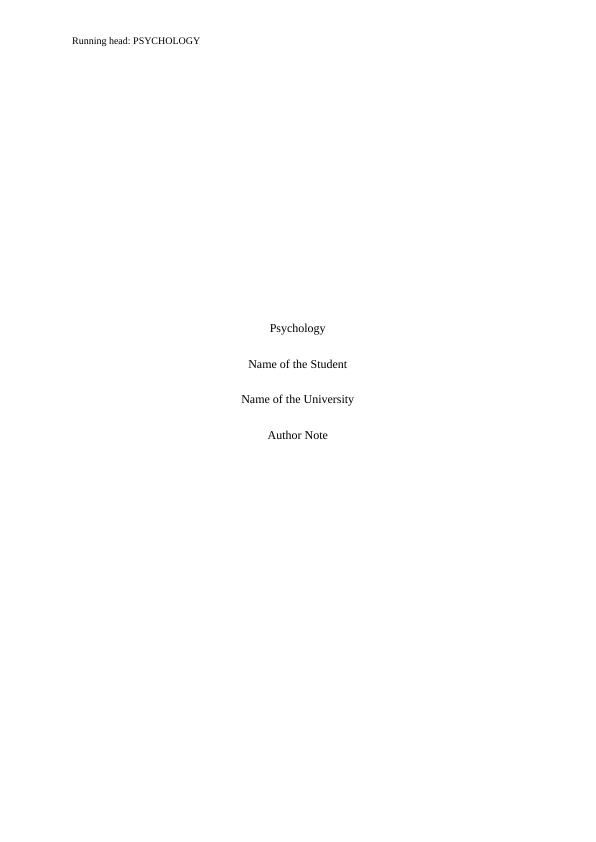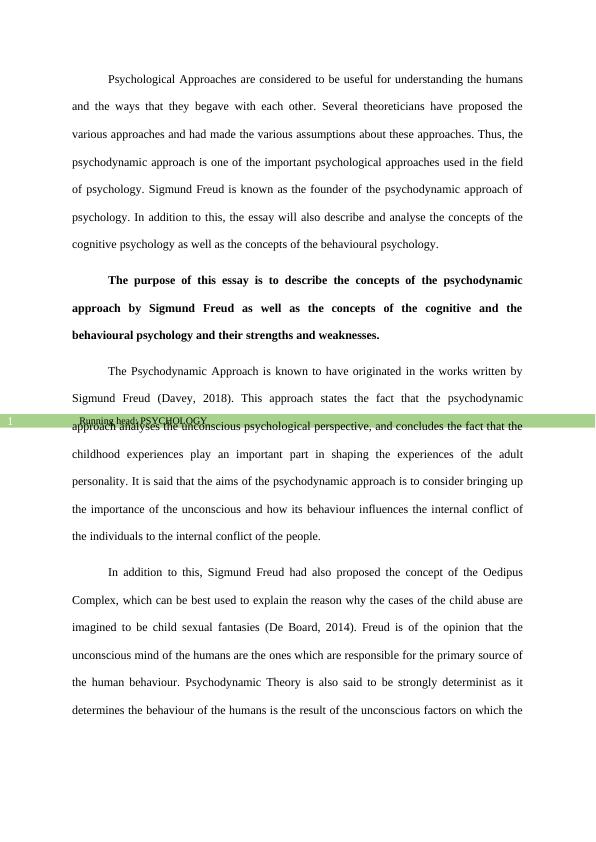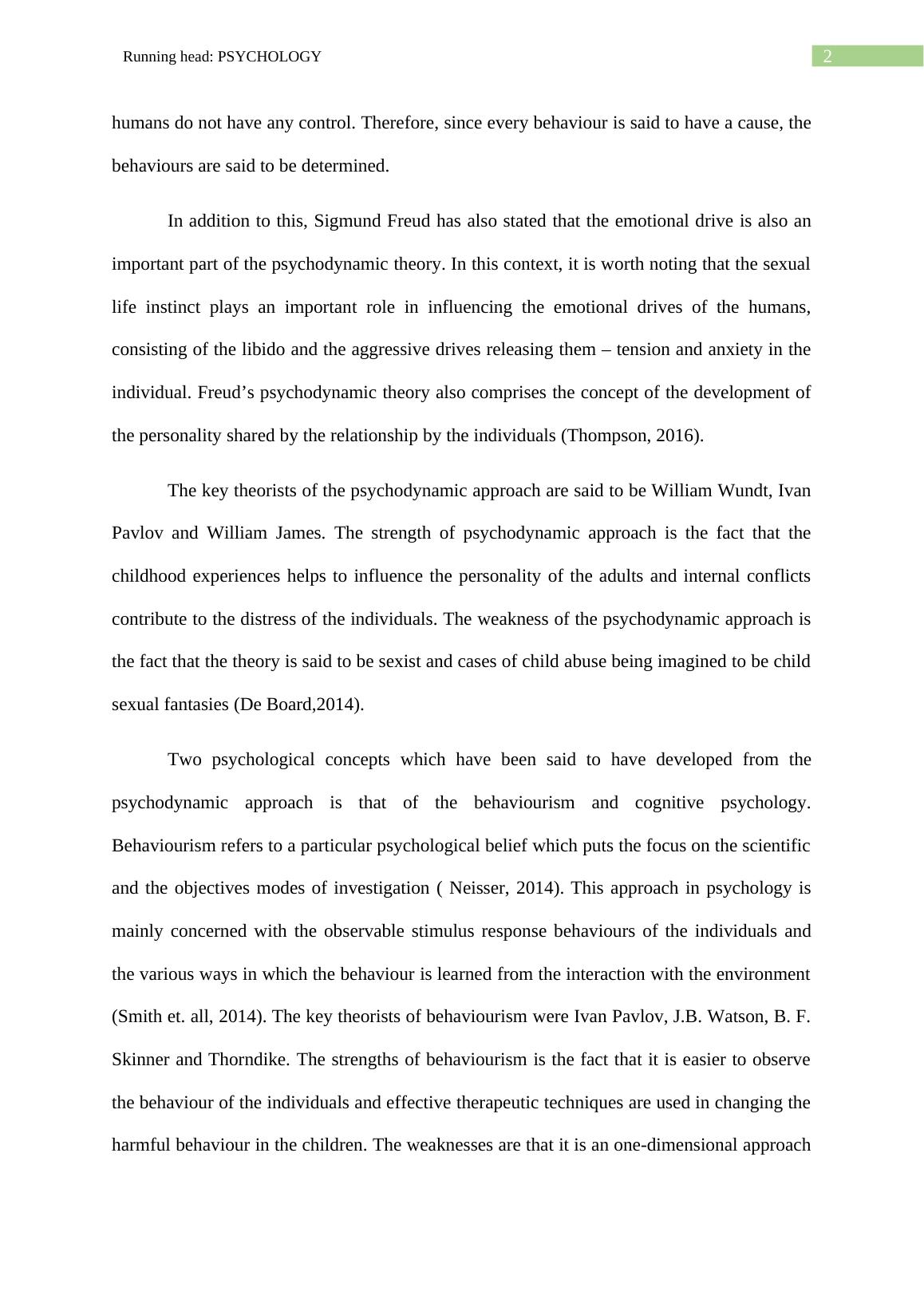Concepts of the Psychodynamic Approach by Sigmund Freud
Added on 2022-09-18
7 Pages1329 Words26 Views
Running head: PSYCHOLOGY
Psychology
Name of the Student
Name of the University
Author Note
Psychology
Name of the Student
Name of the University
Author Note

Running head: PSYCHOLOGY1
Psychological Approaches are considered to be useful for understanding the humans
and the ways that they begave with each other. Several theoreticians have proposed the
various approaches and had made the various assumptions about these approaches. Thus, the
psychodynamic approach is one of the important psychological approaches used in the field
of psychology. Sigmund Freud is known as the founder of the psychodynamic approach of
psychology. In addition to this, the essay will also describe and analyse the concepts of the
cognitive psychology as well as the concepts of the behavioural psychology.
The purpose of this essay is to describe the concepts of the psychodynamic
approach by Sigmund Freud as well as the concepts of the cognitive and the
behavioural psychology and their strengths and weaknesses.
The Psychodynamic Approach is known to have originated in the works written by
Sigmund Freud (Davey, 2018). This approach states the fact that the psychodynamic
approach analyses the unconscious psychological perspective, and concludes the fact that the
childhood experiences play an important part in shaping the experiences of the adult
personality. It is said that the aims of the psychodynamic approach is to consider bringing up
the importance of the unconscious and how its behaviour influences the internal conflict of
the individuals to the internal conflict of the people.
In addition to this, Sigmund Freud had also proposed the concept of the Oedipus
Complex, which can be best used to explain the reason why the cases of the child abuse are
imagined to be child sexual fantasies (De Board, 2014). Freud is of the opinion that the
unconscious mind of the humans are the ones which are responsible for the primary source of
the human behaviour. Psychodynamic Theory is also said to be strongly determinist as it
determines the behaviour of the humans is the result of the unconscious factors on which the
Psychological Approaches are considered to be useful for understanding the humans
and the ways that they begave with each other. Several theoreticians have proposed the
various approaches and had made the various assumptions about these approaches. Thus, the
psychodynamic approach is one of the important psychological approaches used in the field
of psychology. Sigmund Freud is known as the founder of the psychodynamic approach of
psychology. In addition to this, the essay will also describe and analyse the concepts of the
cognitive psychology as well as the concepts of the behavioural psychology.
The purpose of this essay is to describe the concepts of the psychodynamic
approach by Sigmund Freud as well as the concepts of the cognitive and the
behavioural psychology and their strengths and weaknesses.
The Psychodynamic Approach is known to have originated in the works written by
Sigmund Freud (Davey, 2018). This approach states the fact that the psychodynamic
approach analyses the unconscious psychological perspective, and concludes the fact that the
childhood experiences play an important part in shaping the experiences of the adult
personality. It is said that the aims of the psychodynamic approach is to consider bringing up
the importance of the unconscious and how its behaviour influences the internal conflict of
the individuals to the internal conflict of the people.
In addition to this, Sigmund Freud had also proposed the concept of the Oedipus
Complex, which can be best used to explain the reason why the cases of the child abuse are
imagined to be child sexual fantasies (De Board, 2014). Freud is of the opinion that the
unconscious mind of the humans are the ones which are responsible for the primary source of
the human behaviour. Psychodynamic Theory is also said to be strongly determinist as it
determines the behaviour of the humans is the result of the unconscious factors on which the

Running head: PSYCHOLOGY2
humans do not have any control. Therefore, since every behaviour is said to have a cause, the
behaviours are said to be determined.
In addition to this, Sigmund Freud has also stated that the emotional drive is also an
important part of the psychodynamic theory. In this context, it is worth noting that the sexual
life instinct plays an important role in influencing the emotional drives of the humans,
consisting of the libido and the aggressive drives releasing them – tension and anxiety in the
individual. Freud’s psychodynamic theory also comprises the concept of the development of
the personality shared by the relationship by the individuals (Thompson, 2016).
The key theorists of the psychodynamic approach are said to be William Wundt, Ivan
Pavlov and William James. The strength of psychodynamic approach is the fact that the
childhood experiences helps to influence the personality of the adults and internal conflicts
contribute to the distress of the individuals. The weakness of the psychodynamic approach is
the fact that the theory is said to be sexist and cases of child abuse being imagined to be child
sexual fantasies (De Board,2014).
Two psychological concepts which have been said to have developed from the
psychodynamic approach is that of the behaviourism and cognitive psychology.
Behaviourism refers to a particular psychological belief which puts the focus on the scientific
and the objectives modes of investigation ( Neisser, 2014). This approach in psychology is
mainly concerned with the observable stimulus response behaviours of the individuals and
the various ways in which the behaviour is learned from the interaction with the environment
(Smith et. all, 2014). The key theorists of behaviourism were Ivan Pavlov, J.B. Watson, B. F.
Skinner and Thorndike. The strengths of behaviourism is the fact that it is easier to observe
the behaviour of the individuals and effective therapeutic techniques are used in changing the
harmful behaviour in the children. The weaknesses are that it is an one-dimensional approach
humans do not have any control. Therefore, since every behaviour is said to have a cause, the
behaviours are said to be determined.
In addition to this, Sigmund Freud has also stated that the emotional drive is also an
important part of the psychodynamic theory. In this context, it is worth noting that the sexual
life instinct plays an important role in influencing the emotional drives of the humans,
consisting of the libido and the aggressive drives releasing them – tension and anxiety in the
individual. Freud’s psychodynamic theory also comprises the concept of the development of
the personality shared by the relationship by the individuals (Thompson, 2016).
The key theorists of the psychodynamic approach are said to be William Wundt, Ivan
Pavlov and William James. The strength of psychodynamic approach is the fact that the
childhood experiences helps to influence the personality of the adults and internal conflicts
contribute to the distress of the individuals. The weakness of the psychodynamic approach is
the fact that the theory is said to be sexist and cases of child abuse being imagined to be child
sexual fantasies (De Board,2014).
Two psychological concepts which have been said to have developed from the
psychodynamic approach is that of the behaviourism and cognitive psychology.
Behaviourism refers to a particular psychological belief which puts the focus on the scientific
and the objectives modes of investigation ( Neisser, 2014). This approach in psychology is
mainly concerned with the observable stimulus response behaviours of the individuals and
the various ways in which the behaviour is learned from the interaction with the environment
(Smith et. all, 2014). The key theorists of behaviourism were Ivan Pavlov, J.B. Watson, B. F.
Skinner and Thorndike. The strengths of behaviourism is the fact that it is easier to observe
the behaviour of the individuals and effective therapeutic techniques are used in changing the
harmful behaviour in the children. The weaknesses are that it is an one-dimensional approach

End of preview
Want to access all the pages? Upload your documents or become a member.
Related Documents
Psychology: Perspectives, Approaches, and Research Methodslg...
|9
|2512
|304
Psychodynamic Theory: Application and Justification in a Case Studylg...
|9
|2310
|29
Psychology Assignment | Psychological Theorieslg...
|9
|2137
|369
Psychodynamic Theory and Biopsychosocial Framework: Exploring Human Development and Health Factorslg...
|5
|783
|307
Comparing and Contrasting Cognitive Behavioural Theory and Psychodynamic Theory in Counsellinglg...
|6
|1410
|365
Social Work: Psychodynamic Theory 2022lg...
|11
|1877
|19
